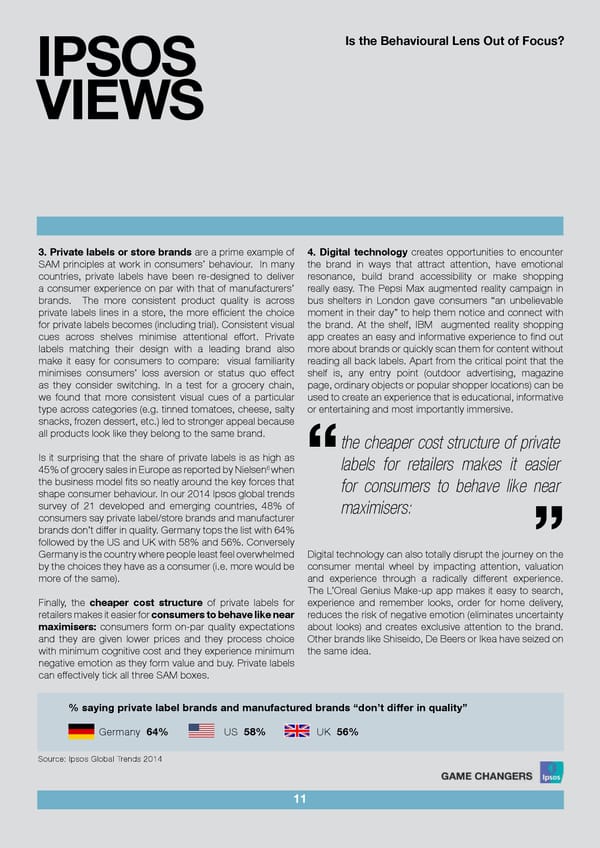IPSOS Is the Behavioural Lens Out of Focus? VIEWS 3. Private labels or store brands are a prime example of 4. Digital technology creates opportunities to encounter SAM principles at work in consumers’ behaviour. In many the brand in ways that attract attention, have emotional countries, private labels have been re-designed to deliver resonance, build brand accessibility or make shopping a consumer experience on par with that of manufacturers’ really easy. The Pepsi Max augmented reality campaign in brands. The more consistent product quality is across bus shelters in London gave consumers “an unbelievable private labels lines in a store, the more efficient the choice moment in their day” to help them notice and connect with for private labels becomes (including trial). Consistent visual the brand. At the shelf, IBM augmented reality shopping cues across shelves minimise attentional effort. Private app creates an easy and informative experience to find out labels matching their design with a leading brand also more about brands or quickly scan them for content without make it easy for consumers to compare: visual familiarity reading all back labels. Apart from the critical point that the minimises consumers’ loss aversion or status quo effect shelf is, any entry point (outdoor advertising, magazine as they consider switching. In a test for a grocery chain, page, ordinary objects or popular shopper locations) can be we found that more consistent visual cues of a particular used to create an experience that is educational, informative type across categories (e.g. tinned tomatoes, cheese, salty or entertaining and most importantly immersive. snacks, frozen dessert, etc.) led to stronger appeal because all products look like they belong to the same brand. the cheaper cost structure of private Is it surprising that the share of private labels is as high as 6 labels for retailers makes it easier 45% of grocery sales in Europe as reported by Nielsen when “ “ the business model fits so neatly around the key forces that for consumers to behave like near shape consumer behaviour. In our 2014 Ipsos global trends survey of 21 developed and emerging countries, 48% of maximisers: consumers say private label/store brands and manufacturer brands don’t differ in quality. Germany tops the list with 64% followed by the US and UK with 58% and 56%. Conversely Germany is the country where people least feel overwhelmed Digital technology can also totally disrupt the journey on the by the choices they have as a consumer (i.e. more would be consumer mental wheel by impacting attention, valuation more of the same). and experience through a radically different experience. The L’Oreal Genius Make-up app makes it easy to search, Finally, the cheaper cost structure of private labels for experience and remember looks, order for home delivery, retailers makes it easier for consumers to behave like near reduces the risk of negative emotion (eliminates uncertainty maximisers: consumers form on-par quality expectations about looks) and creates exclusive attention to the brand. and they are given lower prices and they process choice Other brands like Shiseido, De Beers or Ikea have seized on with minimum cognitive cost and they experience minimum the same idea. negative emotion as they form value and buy. Private labels can effectively tick all three SAM boxes. % saying private label brands and manufactured brands “don’t differ in quality” Germany 64% US 58% UK 56% Source: Ipsos Global Trends 2014 11
 Is the Behavioural Lens Out of Focus? Page 12 Page 14
Is the Behavioural Lens Out of Focus? Page 12 Page 14